I can’t figure out what’s going on unless I go on Facebook. It’s nearly impossible these days to find anyone to go paddling with, discover local events or buy or sell a used piece of gear without it.
Even the paddling coaching service I subscribe to, which built a great little app for its members to communicate with each other, has seen most of its users switch to posting on Facebook since seeding its own demise by starting a public group there. Facebook effectively poached the app’s entire membership base and took over most of its communications. It was like watching a boutique try to compete with the big box stores and then reluctantly list their products on Amazon.
I’m left with the choice of being in the dark, disconnected from my outdoor communities, or logging on.
“This webpage is using significant energy,” warns the browser on my geriatric MacBook, its cooling fans whirring in protest with what I’ve come to think of as the sound of Mark Zuckerberg sucking away and selling my private data. Then I descend into what New York Times writer Charlie Warzel recently called “an information hellscape.”
I’m sure I don’t have to tell you there are all kinds of problems with opening our lives to a company currently being sued by 46 states for illegal competition. Not the least of which is that every piece of information shared to a Facebook group becomes siloed off and unsearchable to the rest of us. The route information and trip reports once commonly shared on public websites and forums were visible to the half of humanity with a data connection but now are limited only to the members of the Facebook group where they’re posted.
Facebook has devoured online paddling communities. I don’t understand why we let it happen. Why did so many groups outsource all their communications to this fractious medium? Why don’t we collectively stop using it? It’s not as if we don’t already have an array of other technological means to connect.
Like a good luddite, I dropped out of social media ages ago. The price is generally being out of the loop with what’s going on in my community—outdoors and otherwise. I figured there must be some people who aren’t online. But I can’t find them. Heck, I just read an article about a couple of hermits who operate a social network for hermits. If that’s not the sign of a lost battle, I don’t know what is.
There’s a digital overlay to real life. In my neighborhood, businesses pop up with almost no visible presence in the concrete world—not so much as a sign—save the snaking lineup of customers who discovered them on Instagram. Someday we won’t need road signs anymore because everybody will be navigating by app or Google Glass; all information stored online, like the Pokémon Go characters people hunt in real-world places but are only visible through a smartphone screen.
This augmented reality layer on top of the one we’re living in is now part of our common language. Without technology, I lose the ability to see, connect and understand. It’s the same feeling I have in an unfamiliar wilderness—lost without the context of natural history, local lore, or even the plants and animals’ names.
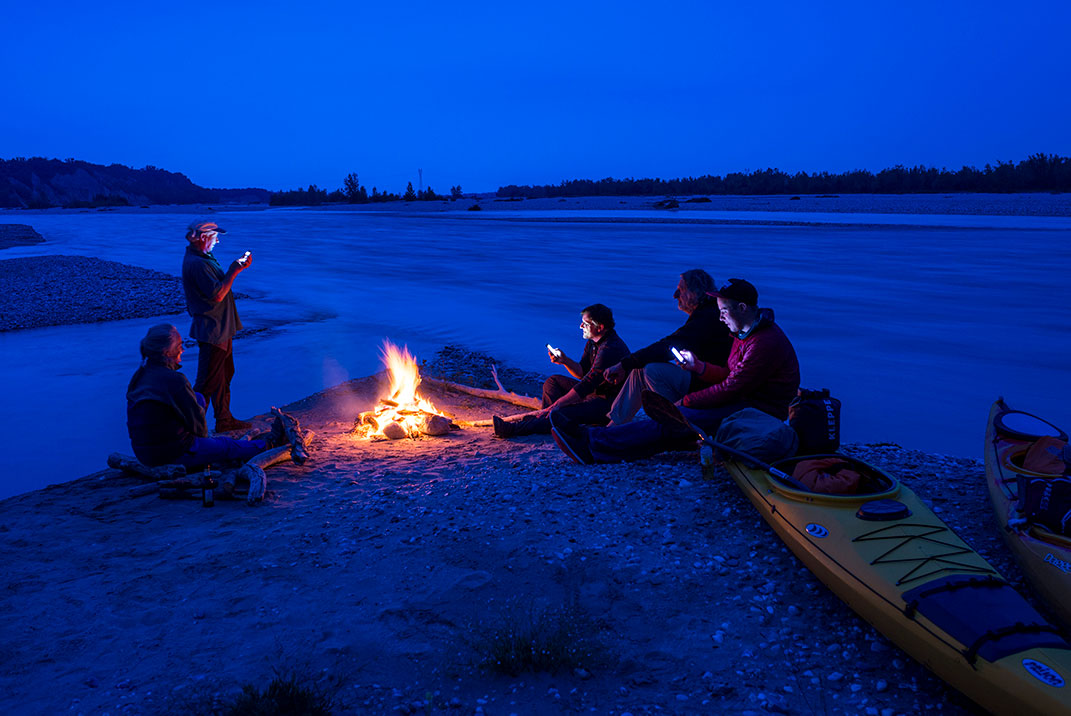
Craving for connection isn’t new. To live within a worldwide web of stories is a human habit older than time. The wonderful new biography Raven’s Witness by Hank Lentfer about the anthropologist Richard Nelson describes his fascination with the lore of Alaska’s Koyukon people, whose stories overlayed the entire physical world with a complex layer of culture.
“The rituals and sensitivities and stories of the Koyukon people comprise what I believe to be humanity’s greatest religious tradition,” Nelson writes. Everything had a relationship to everything else. Every animal sighting or birdsong or place name was a hyperlink to its own remembered story, an ageless lore—the original Internet.
“Their worldview holds the greatest potential for humanity’s future on this planet,” Nelson concluded.
Lost is this web of stories connecting us to the land. But our digital love affair has the potential to fill our landscape with more than Pokemon characters and conspiracy theories. Couldn’t it also help stitch our lost connections back together?
I finally saw this potential when I recently moved to a new town, a place closer to the water and the woods where I could afford a double garage to store my boats and skis. I started out thinking I would explore the area using paper maps and my wits, only to realize it was far easier to follow the routes of local strangers who’ve been generous enough to post their tracks on Strava.
GPS-based route-sharing apps provide the social media connection I’ve been looking for all along, I realized. I can explore freely—always alone but in the footsteps of various like-minded locals, frequently falling back on the GPS to find my way back to the car.
I so enjoy following other people’s adventures, I’ve felt obliged to share my own. So now I’m posting my tracks for all the world to see. No political views or photos of my cats. Just I went there and did that.
“For the good of the community,” I tell myself. Admittedly, I’m also showing off.
I enjoy the creative self-expression of etching a route on the landscape. “For the good of the community,” I tell myself. Admittedly, I’m also showing off, seeking the dopamine gratification of gathering virtual trophies and kudos for my outdoor exploits as much as any teenager counting likes on Instagram.
Maybe I’ve sold my soul. But I’d like to think the problem isn’t social media itself, but the particular agendas of the corporate entities gathering and controlling my data. Strava, at least, seems committed to using its power for good. Last September, the company offered its aggregated user data free to any organization working to “make cities better for anyone on foot or a bike.” The largest collection of human-powered transport information globally, based on 4 billion activities uploaded by 68 million users in 195 countries, revealed that bike travel increased 80 percent in New York City during the pandemic—a powerful, data-driven justification for urban investments, like bike lanes.
Maybe Strava or a similar app can do the same with user data to protect and improve the wild areas we love for all manner of forest trails and paddling put-ins.
Instead of forswearing social media entirely, I can embrace it to the extent that it can be rooted in some bedrock of reality and truth, in geography, in nature itself. Technology has the potential to enhance our vision and illuminate what we hadn’t noticed before, in the same way apps can help us identify new birdsongs, unknown plants or the names of the stars and faint constellations when a smartphone is held up to the sky.
As I paddle or run or ski alone and feed my breadcrumb trail of data points into some cloud-computing server farm, a software engineer in San Francisco could probably identify every tree where I stop to pee or when I duck under a no trespassing sign. But I like to think I’m voting with my feet and my paddle, adding a voice to the places I care about, and will eventually connect with other people who feel similarly the old-fashioned way.
And maybe, over time, we can integrate our routes with other forms of place-based knowledge and rebuild something akin to the Koyukon’s sense of place and shared culture, like the stories once shared around the campfire.
This article was first published in Paddling Magazine Issue 64. Subscribe to Paddling Magazine’s print and digital editions here, or download the Paddling Magazine app and browse the digital archives here.
A luddite in recovery and a former editor of Adventure Kayak magazine, Tim Shuff writes and paddles from the shores of Lake Huron.
Every time his Strava pings, a Luddite gets his wings. | Photo: Michael Neumann




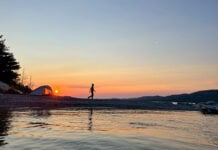
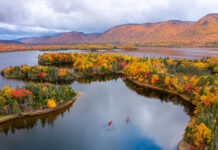
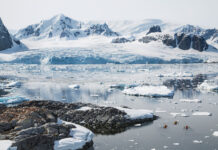
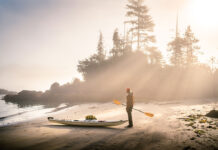
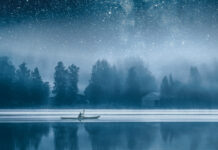

Excellent note, totally agree.
The same thing happens to us, if we don’t publish on networks we don’t exist.
“You navigate more by nets than in the water…”
Greetings and we are waiting for you to navigate the Uruguay River!